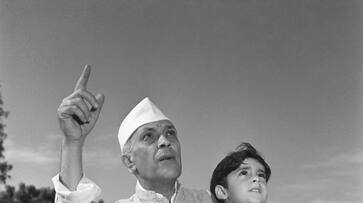A series of decisions and diplomatic moves over decades beginning from Prime Minister Jawaharlal Nehru has been responsible for Nepal’s tilt towards China and Communism over the years
Nepal has been at an unfortunate end of the geo-strategic rivalry between India and the People’s Republic of China for a while now. The Nepal government’s decision to include Limpiyadhura, Lipulekh, and Kalapani has been dubbed as an “unjustified cartographic assertion” by the Indian establishment. One should not seem surprised if the communists in Nepal seem to tow Beijing’s line further. A series of bad decisions by New Delhi since the 1950s has put India in a difficult situation.
During Jawaharlal Nehru’s Prime Ministership, King Tribhuvan suggested the merger of both the countries for better prospects. The threats emerging from the Chinese expansionism reflected towards Tibet concerned India about Nepal’s northern borders. The infrastructure that the Chinese had been building was simply not restricted to Nepal. Beginning at Sin Kiang, a highway was constructed to Tibet that ran through Ladakh in 1958. Right after the Sin Kiang-Tibet highway, the Chinese built roads all the way south that bordered Nepal, Sikkim, and Bhutan. In the summer of 1960, the People's Liberation Army (PLA) soldiers entered Nepal and made an advance towards Bu Ba La. With the assistance of the Central Intelligence Agency (CIA), Tibetan insurgents were hiding there, hoping to fight the Chinese troops. King Mahendra actively cooperated with China, allowing their troops to enter deep inside Nepal’s territory.
Rajiv Gandhi’s handling of the neighbourhood is deeply questionable, especially when it came to Sri Lanka and Nepal. Disagreements on several issues between the former prime minister and King Birendra took to new heights when the Sino-Nepali defence deals were signed. In 1988, tensions emerged between the Government of India and Nepal’s monarchy as Sonia Gandhi was denied entry into the Pashupatinath temple in Kathmandu. Non-Hindus are not allowed entry to the temple’s inner sanctum. Rajiv Gandhi had been on a state visit to Nepal and the incident bittered relations between the two countries for years to come. This prompted Rajiv Gandhi’s government to cut off most of the trade routes, except for a few, leaving Nepal out of medical supplies, fuel, ration, and basic amenities.
To make matters worse, a new revelation made by Amar Bhushan, former Research & Analysis Wing (R&AW), Indian external intelligence wing’s special Director wrote in his book about the plans put forth by the agency to overthrow King Birendra and support the democratic people’s movement in Nepal. This distanced Kathmandu from New Delhi and found its friend in Beijing. The relations were somewhat normalised with the evolution of the Gujral Doctrine in the 90s and a change in South Block’s attitude towards pursuing better relations with immediate neighbours.
A little more than a decade ago, Nepal faced a triangular power contest. The tussle for power was between the monarchy, parliamentary parties and Maoist rebels. India stepped in, brokered a deal between the rebel Maoists and parties and the former gave up arms and joined electoral politics. In less than two to three years, Nepal elected its first-ever communist Prime Minister. Pushpa Kamala Prachanda’s visit to India in 2008 made waves in the diplomatic circles. After all, he too won the elections with a ‘nationalist’ rhetoric and decided to contest elections, promoting democratic values in the country. He met Dr Manmohan Singh, hugged him, attended a special lunch arranged by Sharad Yadav, and spoke at business chamber meetings. Since then, the communists have fought their way for power in Nepal, and India has been placed in a tricky position. The pro-China stance by KP Oli should not be a surprise to anyone.
Now, one may dismiss the Manisha Koirala tweet as attempting to appear nationalistic, it is anything but that. Her grandfather, Bishweshwar Prasad Koirala, was responsible for bringing democratic reforms in the Himalayan nation. His careful balancing of political acculturation between India and Nepal has made a special place for him in the history books. After fighting the 104-year old Rana regime, he led his party to a landslide victory in the 1959 parliamentary elections, only to find himself dismissed from power within a year. King Mahendra, who was pro-China, imprisoned him and many of Koirala’s colleagues.
A series of bad decisions and diplomatic moves beginning from Prime Minister Jawaharlal Nehru to Dr Manmohan Singh has been responsible for Nepali tilt towards Beijing over the years. Rajiv Gandhi will be remembered for his unsuccessful attempts at dealing with challenges in Nepal, which troubles India even today.
(Sharan KA is a post-graduate scholar at the Department of Geopolitics and International Relations, Manipal Academy of Higher Education. He tracks the political developments in South Asia)
Last Updated May 21, 2020, 3:20 PM IST









![Salman Khan sets stage on fire for Anant Ambani, Radhika Merchant pre-wedding festivities [WATCH] ATG](https://static-gi.asianetnews.com/images/01hr1hh8y86gvb4kbqgnyhc0w0/whatsapp-image-2024-03-03-at-12-24-37-pm_100x60xt.jpg)
![Pregnant Deepika Padukone dances with Ranveer Singh at Anant Ambani, Radhika Merchant pre-wedding bash [WATCH] ATG](https://static-gi.asianetnews.com/images/01hr1ffyd3nzqzgm6ba0k87vr8/whatsapp-image-2024-03-03-at-11-45-35-am_100x60xt.jpg)


